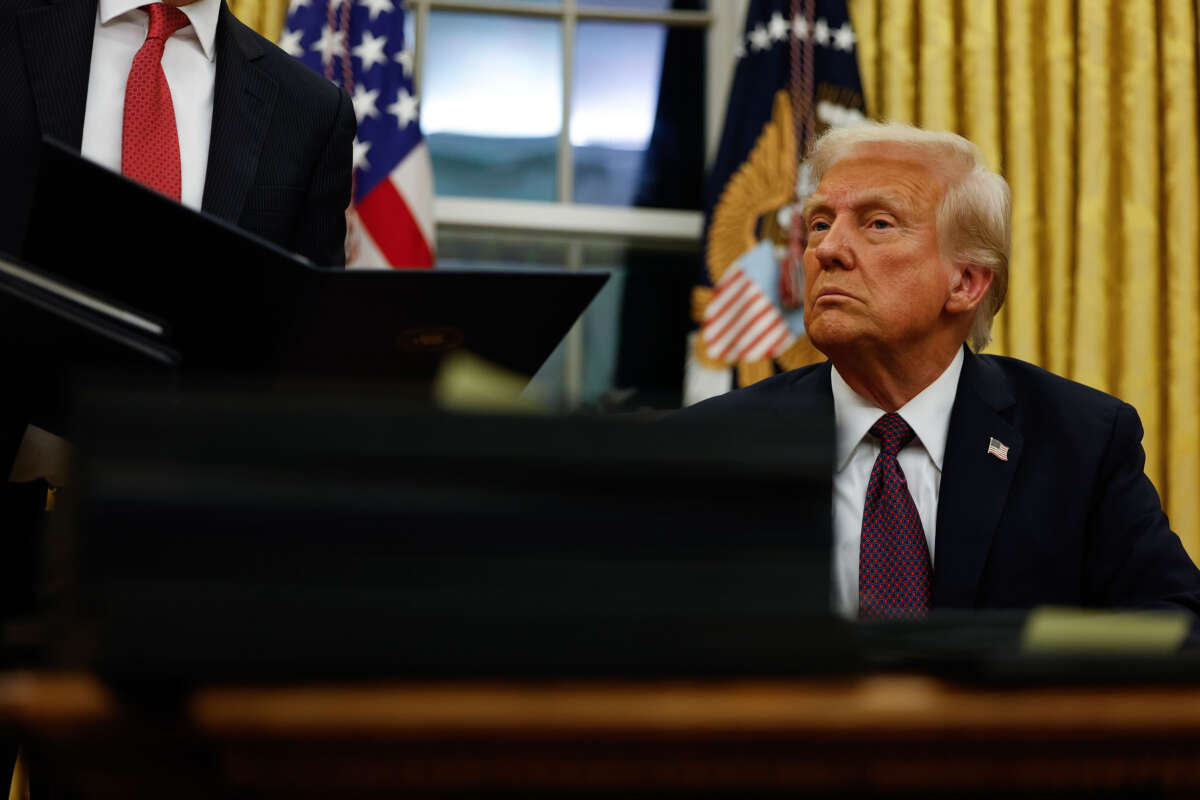On Monday, President Donald Trump issued a multitude of executive orders, including a proclamation “restoring the death penalty” by ending the moratorium on federal executions under former President Joe Biden.
Within his order, Trump called for the use of capital punishment across the U.S. to be expanded, citing the false right-wing talking point that the death penalty is “an essential tool for deterring” crime, a claim that has been long debunked.
There is no meaningful evidence demonstrating that the death penalty deters crimes, and some research has shown that states where the death penalty has been abolished actually have lower murder rates than states that still employ capital punishment.
Notably, the editorial board for Scientific American called for the practice to be completely abolished early last year, citing the many innocent people who have been executed and the fact that the death penalty is disproportionately applied against people of color.
“There is no ethical, scientifically supported, medically acceptable or morally justifiable way to carry it out,” the board stated.
Trump’s executive order on the death penalty also claims that “only capital punishment can bring justice” for victims of heinous crimes and/or their families. However, many victims’ families say that they do not feel a sense of justice after an execution is carried out, and some studies suggest that there are better psychological and even health outcomes for families of victims in states without the death penalty versus states that still have it.
Trump’s order also indicated that his Justice Department may seek to expand the use of the death penalty, so that it can apply to crimes beyond murder. The directive orders the U.S. attorney general to “pursue the death penalty for all crimes of a severity demanding its use.”
The order also calls for the attorney general to “pursue Federal jurisdiction” in order to seek the death penalty in state and local venues when it comes to crimes committed by immigrants and/or involving the killing of law enforcement.
Abraham Bonowitz, executive director of Death Penalty Action, decried the executive order but noted that it was unsurprising, given that Trump “articulated his plan to drastically increase executions” during the 2024 presidential race.
Bonowitz also condemned Trump’s focus on immigrants and crimes against law enforcement, describing it as “unnecessary bluster” on the president’s part, since capital punishment is already utilized in those instances.
He then faulted Biden for not delivering on his campaign promise to end the death penalty in the U.S., noting that Trump would likely pick up from where he left off when he exited office in 2024, when he fast-tracked the execution of more than a dozen people in the final six months of his presidency.
“While expressing both his personal opposition to the death penalty and his desire to maintain the moratorium on executions he imposed in 2021, Biden has nevertheless primed the pump for Donald Trump to resume his execution spree,” Bonowitz said.
Polling shows that support for the death penalty is diminishing within the U.S. While a recent Gallup poll showed that 53 percent of Americans support capital punishment, that number is among the lowest support polled by the agency over the past several decades. A separate Gallup poll from last fall showed that most Americans believe that the death penalty is implemented unfairly, with 50 percent of respondents expressing that view.
We’re not backing down in the face of Trump’s threats.
As Donald Trump is inaugurated a second time, independent media organizations are faced with urgent mandates: Tell the truth more loudly than ever before. Do that work even as our standard modes of distribution (such as social media platforms) are being manipulated and curtailed by forces of fascist repression and ruthless capitalism. Do that work even as journalism and journalists face targeted attacks, including from the government itself. And do that work in community, never forgetting that we’re not shouting into a faceless void – we’re reaching out to real people amid a life-threatening political climate.
Our task is formidable, and it requires us to ground ourselves in our principles, remind ourselves of our utility, dig in and commit.
As a dizzying number of corporate news organizations – either through need or greed – rush to implement new ways to further monetize their content, and others acquiesce to Trump’s wishes, now is a time for movement media-makers to double down on community-first models.
At Truthout, we are reaffirming our commitments on this front: We won’t run ads or have a paywall because we believe that everyone should have access to information, and that access should exist without barriers and free of distractions from craven corporate interests. We recognize the implications for democracy when information-seekers click a link only to find the article trapped behind a paywall or buried on a page with dozens of invasive ads. The laws of capitalism dictate an unending increase in monetization, and much of the media simply follows those laws. Truthout and many of our peers are dedicating ourselves to following other paths – a commitment which feels vital in a moment when corporations are evermore overtly embedded in government.
Over 80 percent of Truthout‘s funding comes from small individual donations from our community of readers, and the remaining 20 percent comes from a handful of social justice-oriented foundations. Over a third of our total budget is supported by recurring monthly donors, many of whom give because they want to help us keep Truthout barrier-free for everyone.
You can help by giving today. Whether you can make a small monthly donation or a larger gift, Truthout only works with your support.
